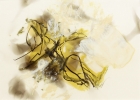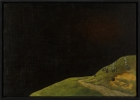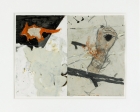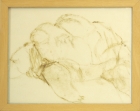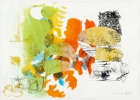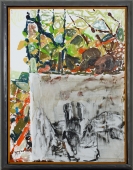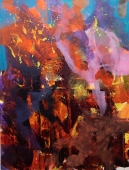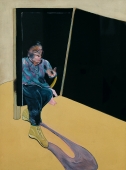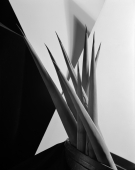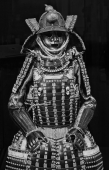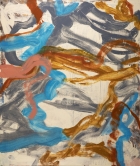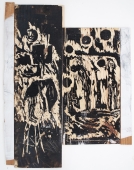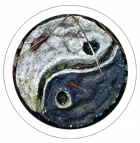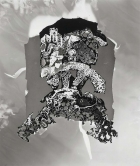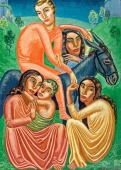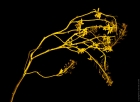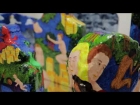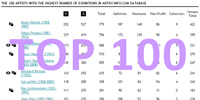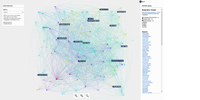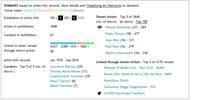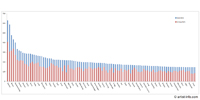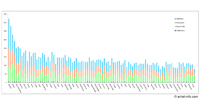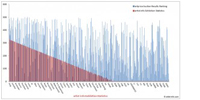
Artist | [Peter Fischli *1952 & David Weiss 1946-2012] Fischli & Weiss (*1979)
Alias: Fischli & Weiss [Peter Fischli *1952 & David Weiss 1946-2012]
https://www.artist-info.com/artist/Fischli-Weiss
Biography
Biography
Peter Fischli
geboren am 8. Juni 1952 in Zürich
1975/76 Accademia di Belle Arti, Urbino
1976/77 Accademia di Belle Arti, Bologna
1979 Beginn der Gemeinschaftsarbeit mit David Weiss
lebt in Zürich
David Weiss
geboren am 21. Juni 1946 in Zürich
1963/64 Vorkurs, Kunstgewerbeschule Zürich
1964/65 Kunstgewerbeschule Basel, Bildhauerklasse - Arbeit als Bildhauer bei Alfred Gruber (Basel) und Jaqueline Stieger (England)
1979 Beginn der Gemeinschaftsarbeit mit Peter Fischli
lebt in Zürich
Solo Exhibitions
Solo Exhibitions
David Weiss
1976 Einzelausstellung Galerie Stähli, Zürich
1979 Einzelausstellung in der Galerie Gugu Ernesto, Köln und in der Galerie t’Venster, Rotterdam
About the work (english / deutsch)
About the work (english / deutsch)
broom cupboard
The broom cupboard by Peter Fischli and David Weiss, visible only through the window in the door, is, as the saying goes, site-specific. What you see is, quite simply, all the things you would expect to see in a broom cupboard beneath the stairs in a museum. The things that pile up, ready to be grabbed, are all made of foam plastic, cut by knife or saw and then smoothed by emery paper and painted: they are feather-light, as useless as the most beautiful soap bubbles that could just as well be crystal balls.
What is going on here? Is the intention to lead the visitors round by the nose? Is the work in question socially critical? Or a new form of realism? Whoever does not read the broadsheet and overlooks the sign with the names of the artists, the title and the materials will end up shaking his or her head muttering something like: "And now they're even putting the broom cupboard an display. No thanks!"
Let us take a moment to ponder things:
1) Fischli / Weiss always produce works that have to do with life, with the lives of us all. At home, we all tend to store the vacuum cleaner and various other cleaning devices away in a cupboard. What are visible are books, pictures, pieces of furniture ... Imagine a family that was just as proud of ist cleaning and household appliances as it was of the other fittings in ist apartment and put these on display for the guests alongside everything else. What else could be a greater surprise and prompt greater displeasure. Yet these appliances are part of our everyday lives and, what is more, they represent work day-in, day-out, and we may have to struggle with ourselves to do the work. The result: both artists are genuinely interested in achieving an exemplary form of dehierarchization (as a metaphor).
2) We are all governed by the generative principle of order and disorder. Whoever speaks of disorder must have a notion of order and vice versa. Our subjective experience ensures that some sort of bearable balance is maintained. This balance is both different and similar from case to case. Dehierarchization as practiced by Fischli and Weiss for a good 12 years now creates the greatest possible disorder, in which, by virtue of their actions and work, they embed a conscious order.
3) Fischli and Weiss are simultaneously dreamers and pragmatists. The US painter Neil Jenney once said: "There are two sides to the artist's nature: he is a bookkeeper who ignores the details and a dreamer who spends days checking the figures." This is also true of Fischli and Weiss. Whosoever lays claim to totality becomes either totalitarian or a poet. Fischli and Weiss are poets par excellence. Their irony is never malicious or cynical, but rather a result of their activity: both distanced and so close to home.
4) Fischli and Weiss do not expose anything. They only put questions in the form of assertions. These are penetrating questions: quiet, subversive, general questions put with such precision that a fine balance is struck between our comfort and discomfort as observers.
Fischli and Weiss have succeeded in transforming the generative principle of order and disorder into one of agreement and disagreement. They have succceded in putting the sham of the "taste of the big wide world" solidly back to earth by using precisely the means of that world of pretense. Yet they do so in such a way that we are not able to distance ourselves from it while recognizing it for the sham it is. Fischli and Weiss proceed from the point where distanciation is no longer possible because I the observer am bound up every day of the week in what it is they describe: part of a dialectic, which expresses the simultaneity and equivalence of affirmation, questioning and rejection as the dilemma of or times.
5) This being the case, the glance we cast on "Everything and Nothing" in the sense of "Suddenly Such Clarity" is no longer that of someone masterfully overseeing things but calls instead for a stance that takes the unspeakable detail as the starting point. This detail opens up our view of the world. And the question that arises with Fischli and Weiss is: What is the world we live in.
German text by Jean-Christophe Ammann / Translation by Jeremy Gaines
(Extract - Full printed version available in the Museum)
MMK - Museum für Moderne Kunst, Frankfurt am Main
Abstellkammer
Die nur durch das Fenster einer Tür einsehbare „Abstellkammer“ von Peter Fischli und David Weiss ist eine ortsspezifische Arbeit: "site specific", wie der englische Ausdruck hierfür lautet. - Zu sehen ist, was eben in der Abstellkammer unter der Treppe eines Museums alles zu finden ist. Was sich da anhäuft und auftürmt, griffbereit, sind alles aus einem geschäumten Kunststoff mit Messer, Säge und Schleifpapier hergestellte und bemalte Gegenstände: Sie sind federleicht, unnütz wie die schönsten Seifenblasen, die auch Kristallkugeln sein könnten.
Was geht hier vor? Sollen die Besucher an der Nase herumgeführt werden? Handelt es sich etwa um eine sozialkritische Arbeit? Um eine neue Form von Realismus? Wer den Handzettel nicht liest und das Schild mit den Namen der Künstler, dem Titel und den Materialien übersieht, wird einmal mehr den Kopf schütteln. Etwa im Sinne: "Jetzt wird uns also noch die Abstellkammer des Museums vor Augen geführt. Nein Danke!"
Versuchen wir kurz darüber nachzudenken:
1) Die Arbeiten von Fischli / Weiss handeln immer vom Leben, vom Leben eines jeden einzelnen. Bei uns Zuhause haben wir den Staubsauger und die diversen Reinigungsgeräte auch in einem Schrank verstaut. Sichtbar sind Bücher, Bilder, Möbel ... Man stelle sich vor, eine Familie ist ebenso stolz auf die Reinigungs- und Haushaltsgeräte wie auf die übliche Wohnungseinrichtung und führt diese gleichberechtigt den Gästen vor Augen. Das Erstaunen und Mißfallen könnte nicht größer sein. Aber diese Geräte sind doch Teil unseres Alltags, und vor allem bedeuten sie tagtäglich ein Stück Arbeit, die auch eine gewisse Überwindung abverlangt. Konsequenz: beispielhafte Enthierarchisierung (als Metapher) ist ein genuines Anliegen der beiden Künstler.
2) Wir sind alle dem generativen Prinzip von Ordnung und Unordnung unterworfen. Wer Unordnung sagt, muß eine Vorstellung von Ordnung haben. Das Umgekehrte trifft ebenso zu. Unsere subjektive Erfahrung sorgt für ein erträgliches Gleichgewicht. Dieses Gleichgewicht ist von Fall zu Fall ähnlich und verschieden. Die Enthierarchisierung, wie sie Fischli / Weiss seit zwölf Jahren betreiben, schafft eine größtmögliche Unordnung, in die sie, handelnd, ausführend, eine bewußte Ordnung einbeziehen.
3) Fischli / Weiss sind Träumer und Pragmatiker zugleich. Der amerikanische Maler Neil Jenney sagte einmal: "Die Natur des Künstlers ist ein Ding mit zwei Seiten: Ein Buchhalter, der das Detail außer acht läßt, und ein Träumer, der tagelang nachrechnet." Das trifft auch für Fischli / Weiss zu. Wer die Totalität beansprucht, wird totalitär oder Poet. Fischli / Weiss sind Poeten par excellence. Ihre Ironie ist nie bösartig oder zynisch. Sie ist eine Folge ihres Tuns, distanziert und hautnah zugleich.
4) Fischli / Weiss entlarven nichts. Sie stellen, feststellend, nur Fragen. Diese Fragen sind bohrend, leise, subversiv, sind allgemein und so präzis, daß Behagen und Unbehagen sich stets die Waage halten.
Fischli / Weiss ist es gelungen, das generative Prinzip von Ordnung und Unordnung in Stimmigkeit und Unstimmigkeit umzuwandeln. Es ist ihnen gelungen, die vorgegaukelte Vision des "Dufts der weiten Welt" auf den Boden der Realität mit den Mitteln dieser vorgegaukelten Welt selbst zurückzubringen. Aber keinesfalls so, daß ich mich erkennend distanzieren kann. Fischli / Weiss setzen dort ein, wo die Distanzierung gar nicht möglich ist, weil ich als Betrachter tagtäglich impliziert bin: Teil einer Dialektik, in welcher sich die Gleichzeitigkeit und Gleichwertigkeit von Befürwortung, Infragestellung und Ablehnung - als Dilemma unserer Zeit ausdrückt.
5) Wenn dem so ist, entspricht das Augenmerk auf Alles und Nichts im Sinne von "Plötzlich diese Übersicht" nicht mehr dem quasi souveränen Blick, sondern verlangt nach einer Sicht, ausgehend vom unsäglichen Detail. Dieses Detail öffnet den Blick auf die Welt. Und die Frage stellt sich mit Fischli / Weiss: In welcher Welt leben wir?
Text von Jean-Christophe Ammann
(Auszug - Der vollständige Text ist als Informationsblatt beim Museum erhältlich)
MMK - Museum für Moderne Kunst, Frankfurt am Main
Bibliography
Bibliography
"Plötzlich diese Übersicht"; Stähli, Zurich, 1982
Catalogue; Kunsthalle, Basel, 1986
Catalogue; Portikus, Frankfurt/Main, 1988
Photographs; Catalogue of the 20th International Biennial, São Paulo, 1989; Bern & Zurich, 1989
Airports; Catalogue of The Valencia Institute of Modern Art [IVAM], Valencia & Zurich, 1990
Das Geheimnis der Arbeit. Texte zum Werk von Peter Fischli & David Weiss; Catalogue, Kunstverein Munich and Kunstverein für die Rheinlande und Westfalen, Düsseldorf, 1990/1
Bilder, Ansichten; Catalogue, Vienna Secession, 1991
Siedlungen, Agglomeration; Catalogue, Kunsthalle Zurich, 1993
Ammann, Jean-Christophe/ Lauter, Rolf: Peter Fischli / David Weiss. Raum unter der Treppe. Verlag Cantz, Ostfildern-Ruit, 1995.
ISBN: 3-89322-761-X
Publications
Publications
David Weiss
1970 Sketches, Bern, Edition Toni Gerber (mit Urs Lüthi, Text J.-Chr. Ammann)
1974 Drei Geschichten, Zürich, Edition Stähli
1975 Up and Down Town, Zürich: Edition Stähli
The Desert is Across the Street (mit Urs Lüthi und Elke Kilga), Galerie Stähli, Zürich / de Appel, Arnsterdam
 offers / Requests offers / Requests  |
About this service |
|---|
 Exhibition Announcements Exhibition Announcements  |
About this service |
|---|
 Visualization |
Learn more about this service | ||
|---|---|---|---|
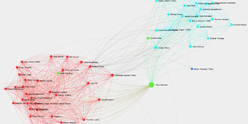
Interested in discovering more of this artist's networks?
3 easy steps: Register, buy a package for a visualization, select the artist.
See examples how visualization looks like for an artist, a curator, or an exhibition place: Gallery, museum, non-profit place, or collector.

Exhibition History

|
SUMMARY based on artist-info records. More details and Visualizing Art Networks on demand. Venue types: Gallery / Museum / Non-Profit / Collector |
||||||||||||
| Exhibitions in artist-info | 245 (S 50/ G 195) |
Did show together with - Top 5 of 2731 artists (no. of shows) - all shows - Top 100
|
||||||||||
| Exhibitions by type | 245: 60 / 91 / 86 / 8 | |||||||||||
| Venues by type | 187: 48 / 66 / 67 / 6 | |||||||||||
| Curators | 125 | |||||||||||
| artist-info records | Jul 1981 - Jan 2023 | |||||||||||
|
Countries - Top 5 of 23 Germany (87) United States (52) Switzerland (29) United Kingdom (13) France (10) |
Cities - Top 5 of 103 New York (36) Köln (14) Zürich (12) Frankfurt am Main (12) London (9) |
Venues (no. of shows )
Top 5 of 187
|
||||||||||
Curators (no. of shows)
Top 5 of 125
|
| Kunstmuseum Bonn | G | Oct 2022 - Jan 2023 | Bonn | (181) | +1 | |
| Whitechapel Gallery | G | Feb 2022 - Jun 2022 | London | (417) | +0 | |
| Blazwick, Iwona (Curator) | +0 | |||||
| Tower - MMK | G | Mar 2018 - Jul 2018 | Frankfurt am Main | (10) | +0 | |
| Centre Pompidou - Metz | G | Mar 2017 - Aug 2017 | Metz | (27) | +0 | |
| Lavigne, Emma (Curator) | +0 | |||||
| Meisel, Hélène (Curator) | +0 | |||||
| Art Gallery of Alberta - AGA | G | Feb 2017 - Jun 2017 | Edmonton | (64) | +0 | |
| Galerie Claudia Delank - Berlin | G | Jul 2016 - Sep 2016 | Berlin | (17) | +0 | |
| Keep reading |
















